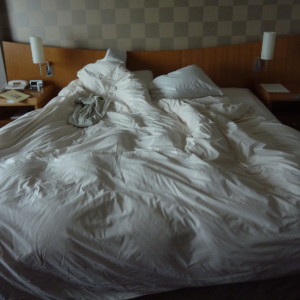Some readers of my Second Opinion articles have characterized my posts as mature. Others have said my posts are not likely to be appropriate for young readers. I’ll let you be the judge, but if the truth is to be written, both genders worry about how they will perform, and getting it right in the bedroom undeniably has its rewards.
There are five steps to getting your bedroom ready for what we all desire:
- Get Rid of the Clutter: Having to “watch your step” en route from the door to the bed is a mood killer. Glancing up to see a pile of papers you have to read for work tomorrow invariably will spoil the mood.
- Get the Lighting Right: No one wants to do it under harsh, unflattering light. Prepare the bedroom with dim lighting.

- The Sheets Make All the Difference: Even if your ‘bed’ is just a box spring on the floor, the least you can do is make it inviting. You should own a set of nice, high thread count, really soft sheets!
- Fill the Room with Fresh Air: Leave the window to your bedroom open during the day to fill the room with fresh air. Air in the house is usually worse than the outdoors.
- Light Music Elevates the Mood: The music should be non-vocal, light sounds to put and keep you in the mood.

The Naked Facts
It all comes down to consensual choice. Some people prefer to start naked; others prefer to start moderately clothed then peel off layer after layer, depending how hot they get. Some people prefer to shower before, others like the experience of au naturale. Whatever your taste and predilection, if you want to get better in the bedroom, talk to an expert who has perfected the bedroom act of Sleep.
A 2013 Gallup poll found that Americans sleep an average of 6.8 hours a night, but get far less sleep than Americans got in 1974 when the average American slept 7.9 hours per night. Unfortunately, a lack of sleep, and especially chronic sleep deprivation, has serious health consequences.
 Sleep is incredibly important for optimal mental processing. While we sleep, our neurons rest, and the brain constructs new neural pathways, which is why sleep is so important for learning. Even mild chronic sleep deprivation can have a serious impact on creativity and innovation. Getting enough sleep is important to physical health and healing. While we sleep, our bodies produce cytokines and other natural antibodies pivotal to our immune system.
Sleep is incredibly important for optimal mental processing. While we sleep, our neurons rest, and the brain constructs new neural pathways, which is why sleep is so important for learning. Even mild chronic sleep deprivation can have a serious impact on creativity and innovation. Getting enough sleep is important to physical health and healing. While we sleep, our bodies produce cytokines and other natural antibodies pivotal to our immune system.
Sleep deprivation increases the levels of the stress hormone cortisol, while at the same time decreasing the hormone leptin which lets our brain know you’ve had enough to eat, and increasing ghrelin, an appetite stimulant. Thus, getting more sleep may be an important factor in helping you with dieting and making healthier eating choices.
As you begin the New Year, one of the healthiest gifts you can give yourself is eight hours of sleep a night. You are likely to notice significant changes in your mood and an improved ability to regulate your emotions. There are many benefits to getting better in the bedroom.
Helpful hints on setting and maintaining a healthier sleep regime:
- Make Sleep a Priority: Determine to give yourself one of the most inexpensive and yet most effective health benefits available – at least 8 hours of sleep a night.
- Develop a Sleep Routine: Try to go to bed and wake up at the same time each day. Studies have shown going to sleep at 10 p.m. and waking at 6 a.m. works best for the body’s natural rhythms. Always go to bed the same day you woke up.

- Make the Bed a “Sleep Only” Space: Many people convert their bed into an all-purpose area. Eating in bed, watching TV, or even working in bed can make it more difficult for you to sleep in it at night.
- Avoid Eating and Exercising within Three Hours of Sleep: Important to remember that eating and exercise energizes the body so it is not ready for sleep.
- Turn Off The Lights (and Devices): The sleep area must be dark and quiet. The hormone melatonin is produced in total darkness, and the longer you stay in the dark, the more melatonin the pineal gland produces. Melatonin regulates our sleep and wake cycles, destroys free radicals, increases the immune system’s killer lymphocytes, and more. If you need a night light, a dim red light is best.Additionally, blue wavelength light emitted from TVs, computer screens and cell phones suppresses melatonin production more than other wavelengths, so if you want to get better in bed, avoid exposure to blue wavelength lights 2-3 hours before bedtime.
- Listen to Your Body: Once you’ve committed to a sleep routine, your body can awaken on time naturally. Listening to your body is the best measure of whether you’re getting sufficient rest.


